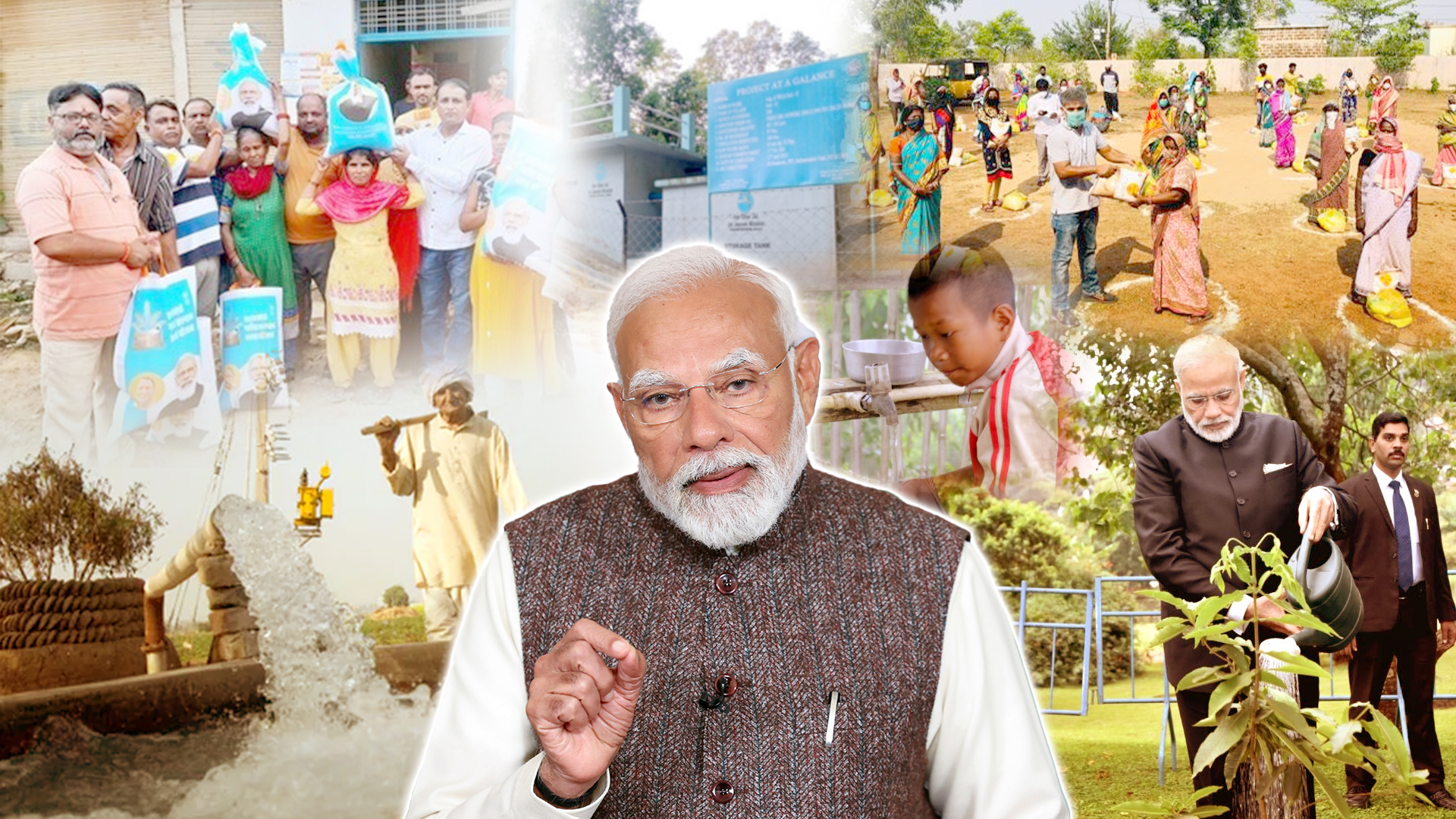A Nation that aspires to find prominence among its global counterparts, can achieve its objective only if it is able to strike a perfect balance between economy and ecology. And for a Nation like Bharat, which has always valued a comprehensive approach in its every policy, to safeguard the ecological elements and prioritize them than merely focusing on economic growth. 1) Upgradation in public lifestyle, 2) attention on soil health, 3) conservation of water bodies, 4) afforestation and 5) safeguarding fauna are the 5 distinct aspects (Pancha Tattva) of ecology. The Modi Govt, in its every policy, apart from focusing on uplifting the economic condition of more than a billion population, also provided a green touch to safeguard our environment and biodiversity.
Antyodaya: In order uplift public lifestyle of a common citizen, the Modi Govt after assuming office in 2014, chalked out a holistic action plan based on the guiding principle of ‘Antyodaya’ (uplifting the last man standing in the economic que) laid out by Pt. Deen Dayal Upadhyaya. In its mission to achieve the target within a stipulated timeline, the Govt identified the basic needs of the underprivileged and rolled out a package of schemes targeting those at the bottom of the economic pyramid.
Such schemes include providing the weaker sections of the society with – a house (PM Awas Yojana), free ration including cereals & pulses (PM Garib Kalyan Anna Yojana), water facility (Jal Jeevan), cooking gas connection (PM Ujwala Yojana), Toilets (Swachh Bharat Mission), Lighting facility (Ujala / Surya Ghar Yojana) and health support with medicines at reduced price (relaunch of Janaushadhi Kendras). Until now, significant progress has been made in delivering these benefits, with adequate budgetary support.
Soil Health – A key priority: In a program in 2022, PM Modi outlined the need to conserve soil health through 5 focus areas – to make soil chemical free, to save soil organic matter, maintain soil moisture, to tackle the soil erosion arising due to ground level water depletion and to safeguard soil from the reduction of forest cover. To achieve this, a comprehensive Agricultural policy has been implemented, including promoting bio-waste and compost as natural manure, establishing bio-gas plants under GOBARdhan scheme, 100% neem coated urea for farmers, Issuing Soil Health Cards to assess soil condition and optimize fertilizer use, and encouraging crop rotation. In the past 8 years around 1,600 new seed varieties were made available to farmers. Modi Govt has also set a target to restore 26 million hectares of degraded / deforested land by 2030.
Water Conservation Efforts: A clarion call ‘Per Drop More Crop’ was made to encourage the farmers to opt for drip irrigation rather than flood irrigation. PM Krishi Sinchayai Yojana was rolled out for this purpose in 2015. ‘Namami Gange’ scheme was unveiled in 2014, with a mission to clean & rejuvenate river Ganga. It was inaugurated as a Govt program with public participation that includes cleaning river ghats & crematoriums, effluent treatment, rural sanitation, river front management etc. By 2022, 147 out 341 projects relating to sewage infrastructure were completed. ‘Amrit Sarovar’ scheme was introduced in 2022, with a mission to construct / rejuvenate ponds with area of at least one acre and water holding capacity of 10,000 cubic meters. The mission targets each district to create 75 such Amrit Sarovars surrounded by trees like Neem, Peepal and Banyan. Modi Govt is also in the process of interlinking of rivers to channelize excess water into draught areas. The foundation for the process was laid with Ken-Betwa River linking in Madhya Pradesh in 2024.
Afforestation & Urban Green Initiatives: Afforestation provides a healing touch to ecology amidst unchecked rapid urbanization. Modi Govt to address this issue, launched Nagar Van Yojana in 2020 aiming at developing 400 urban forests and 200 urban groves to provide green cover outside forest areas in urban centers, to enhance better livelihood, environment, and biodiversity. An emotional call ‘Ek Ped Maa Ke Naam’ and an action plan involving Govt agencies, village level institutions, NGOs, students, local people & other stake holders resulted in planting of 80 crore seedlings across the Nation in Sep 2024 as per PIB report, and the mission continues. A budgetary support was provided in 2023-24 for mangrove plantations and wetlands conservation, under the MISHITI scheme. In 2022, PM Modi in a program mentioned that due to the sustained efforts our forest cover increased by 20,000sq kms in 8 years.
Wildlife Protection & Conservation: Wildlife is integral to ecological balance & the Modi Govt is working in this regard to create a conducive environment for fauna. In 2024 Bharat became the first country in the world to prepare a checklist of its entire fauna, covering 104,561 species. Due to sustained efforts, between 2014-2020, the population of tigers increased by 30%, lions by 29% and leopards by 75%. In 2022, cheetahs were reintroduced in our country from Africa. Due to anti-poaching measures, rhino numbers tripled from 1,500 to 4,000 in the last 4 decades (as of 2024). Railways to safeguard elephants is working on installing optical fiber systems & AI-based intrusion deduction to prevent accidents on railway tracks. Apart from wildlife, to assist farmers and their livestock, National Animal Disease Control program (2019) was launched to eradicate Foot and Mouth disease and Brucellosis among livestock like cows, bulls, buffaloes, sheep, goats, and pigs. As a part of National Livestock mission, an entrepreneurship scheme was launched by providing 50% capital subsidy for conserving and breeding of horses, donkeys, camels, and mules.
Conclusion: In the years to come, the Nation will recognize and celebrate Modi Govt’s Green Touch initiatives and commitment towards ‘Janata (people), Jameen (soil), Jal (water), Jungle (forests) aur Jaanwar (and wildlife).’
(The views expressed are the author's own and do not necessarily reflect the position of the organisation)


